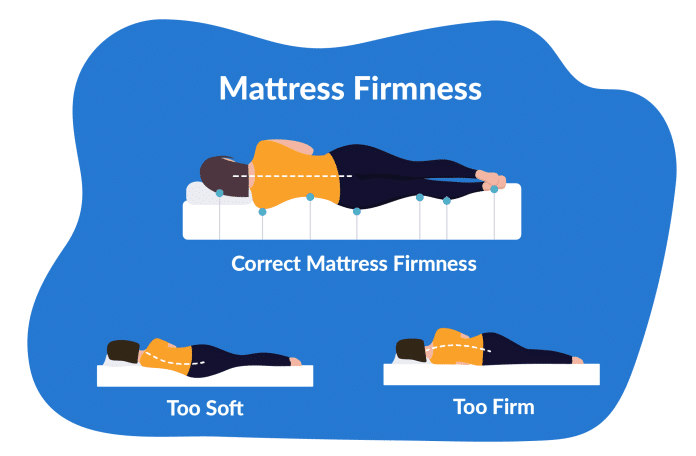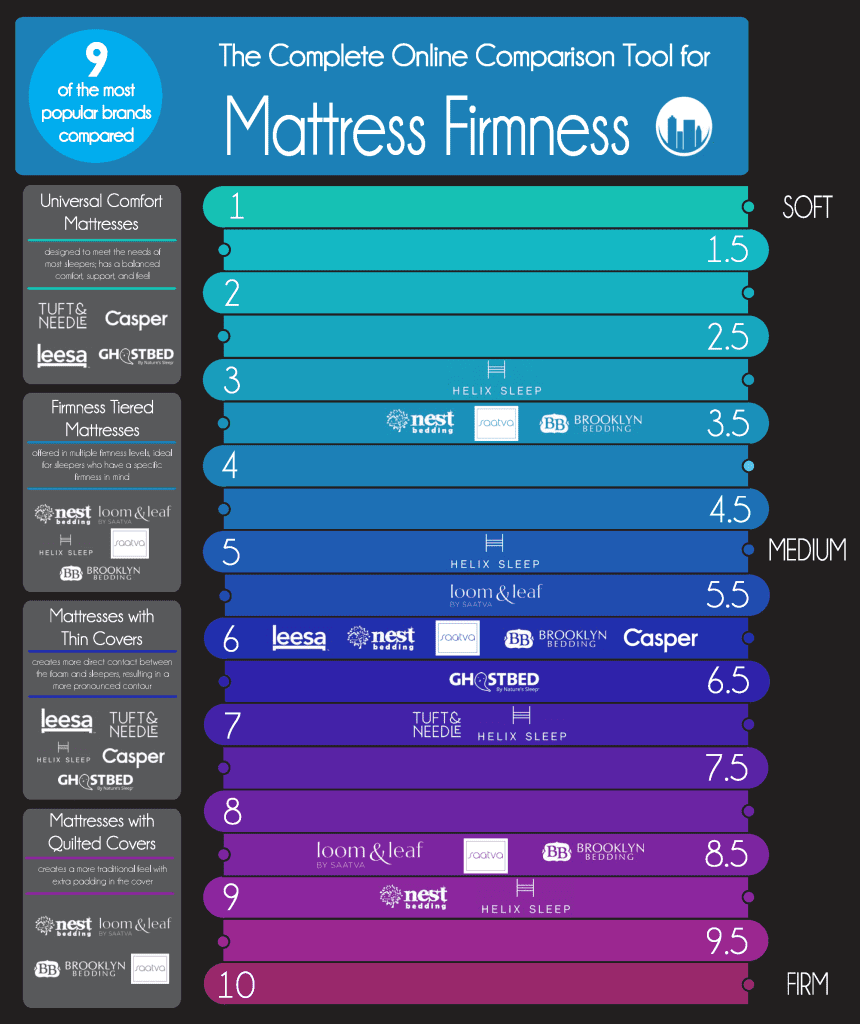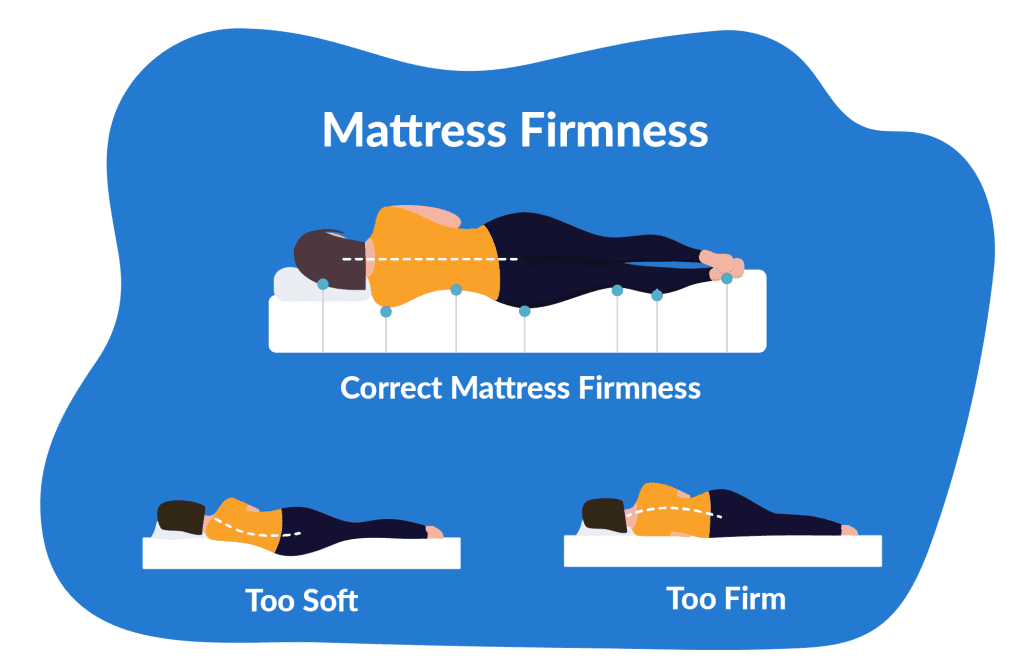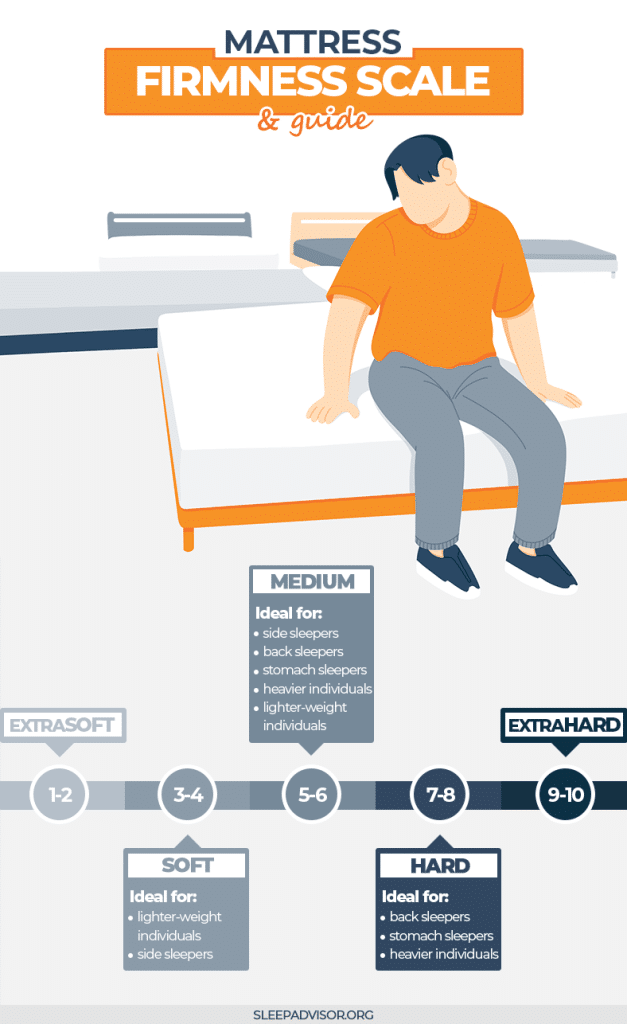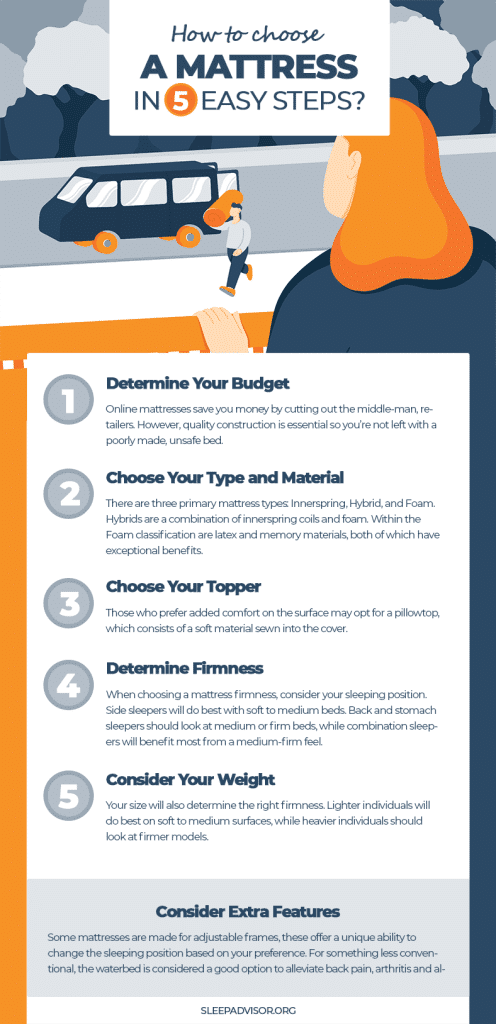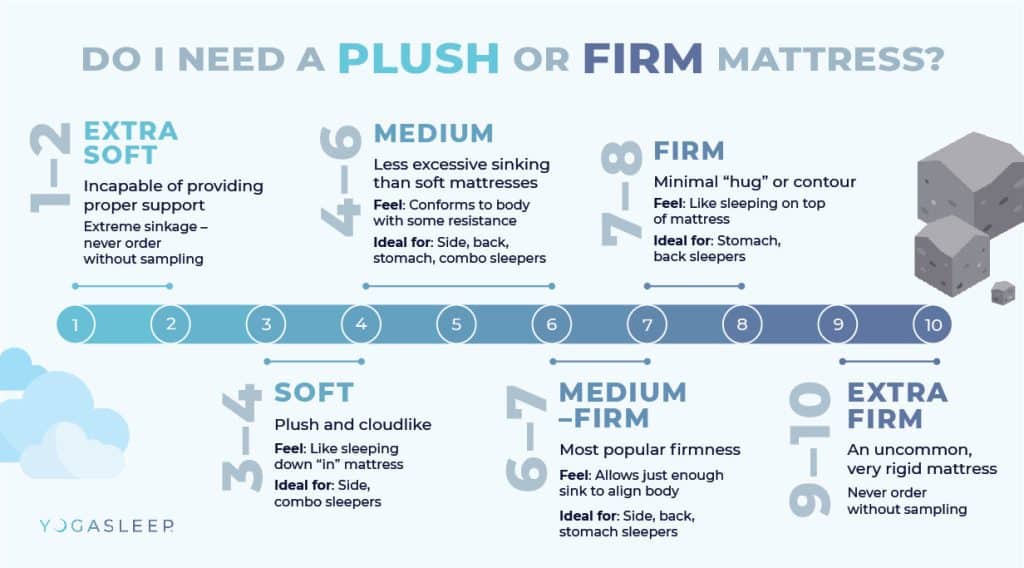Choosing the right mattress firmness can sometimes feel daunting, filled with endless options and conflicting advice.
But fear not because we’re here to help! In this article, we’ll guide you through selecting the perfect mattress firmness for your needs.
From understanding the different firmness levels to considering your sleep position and body type, we’ve got you covered.
So, buckle up and get ready to find your ultimate sleeping companion!
Review contents
Factors to Consider
When choosing the right mattress firmness, there are several factors to consider. Each individual is unique and has different preferences and needs regarding their sleep surface. By considering these factors, you can ensure that you select a mattress with the perfect firmness for you.
Sleeping Position
One important factor to consider is your sleeping position. The position in which you sleep greatly affects the support and comfort your body needs. Different sleeping positions require different firmness levels to ensure proper spinal alignment and pressure relief.
- Side Sleepers: Side sleepers generally benefit from a medium to medium-soft firmness mattress. This helps to cushion the shoulders and hips and relieve pressure points.
- Back Sleepers: Back sleepers typically need a medium to medium firmness mattress. This provides support to the spine while allowing for a comfortable sleep surface.
- Stomach Sleepers: Stomach sleepers usually require a firmer mattress to prevent the hips from sinking too much, which can lead to back pain. Medium-firm to firm mattresses are often recommended for stomach sleepers.
- Combination Sleepers: A medium-firm mattress can be a good choice if you tend to change your sleeping position throughout the night. This firmness level balances support and comfort, accommodating various sleeping positions.
Body Weight
Your body weight is another important factor to consider when choosing mattress firmness. The amount of weight a mattress needs to support can affect how firm or soft it feels.
- Lightweight Individuals: Lightweight individuals may find that a softer mattress provides the proper comfort and support for their body. Softer mattresses can contour to their lighter body weight and provide pressure relief.
- Average Weight Individuals: A medium-firm mattress is often recommended for individuals of average weight. This firmness level offers a good balance of support and comfort.
- Heavyweight Individuals: Heavyweight individuals typically need a firmer mattress to prevent sinking too deeply into the sleep surface. A firm mattress can provide the necessary support and prevent discomfort.
Medical Conditions
If you have any pre-existing medical conditions, it’s crucial to consider how mattress firmness can impact your symptoms and overall comfort.
- Back Pain: A medium-firm to firm mattress is often recommended for individuals with back pain. This provides the necessary support to maintain proper spinal alignment and reduce pressure on the back.
- Shoulder Pain: If you experience shoulder pain, a slightly softer mattress can help alleviate discomfort. A medium-firm mattress with some added plushness may be beneficial.
- Arthritis: Those with arthritis may benefit from a mattress that offers pressure relief and contours to the body’s natural curves. A medium to medium-soft mattress can relieve and aid in minimizing joint stiffness.
- Sleep Apnea: Sleep apnea often requires sleeping in an elevated position to improve airflow. An adjustable mattress that allows for different incline positions can be beneficial in this case.
Personal Preference
Personal preference plays a significant role in choosing the right mattress firmness. What feels comfortable to one person may not be the same for another. Here are a few factors to consider when determining personal preference:
- Preference for Plushness or Firmness: Some prefer a plush, soft feel, while others enjoy a firmer sleep surface. It’s essential to consider your personal preference when selecting mattress firmness.
- Heat Retention and Breathability: A firmer mattress with better breathability may be ideal if you tend to sleep hot. Softer mattresses may trap heat, making you feel uncomfortably warm during the night.
- Motion Transfer and Durability: If you share your bed with a partner, you may want to consider a mattress with good motion isolation. This ensures you won’t be disturbed by their movements throughout the night. Additionally, durability is a factor to consider, especially if you’re looking for a mattress that lasts many years.
- Consideration of Partner’s Preference: If you sleep with a partner, it’s also essential to consider their preferences. A compromise may be necessary to ensure both individuals are comfortable and well-rested.
Understanding Mattress Firmness
Now that we’ve explored the factors to consider when choosing mattress firmness, let’s delve deeper into understanding what mattress firmness means.
Firmness Scale
Mattress firmness is typically rated on a scale from 1 to 10, with 1 being incredibly soft and 10 extremely firm. This scale helps individuals gauge the support and comfort a mattress provides.
Different Firmness Levels
Mattresses come in various firmness levels, ranging from soft to firm. The most common levels include:
- Soft: Soft mattresses have a plush, cushion-like feel. They often contour to the body and provide pressure relief. They are ideal for side sleepers and those who prefer a soft sleep surface.
- Medium-Soft: Medium-soft mattresses offer a balance between softness and support. They provide some contouring and pressure relief while maintaining a slightly firmer feel. This firmness level is often recommended for individuals who sleep on their side or have lighter body weight.
- Medium: Medium-firmness mattresses are versatile and suitable for many sleepers. They provide a balance of support and comfort and are often recommended for back sleepers and combination sleepers.
- Medium-Firm mattresses offer a slightly firmer feel while providing adequate support and pressure relief. They are recommended for back or stomach sleepers and individuals with average body weight.
- Firm: Firm mattresses provide a solid, supportive feel with minimal give. They are often recommended for stomach sleepers and individuals who prefer a firmer sleep surface.
Impact on Sleep Quality
The firmness of your mattress can significantly impact your sleep quality. A mattress that is too firm or soft for your body’s needs can lead to discomfort, pain, and poor sleep.
- Too Firm: Sleeping on a mattress that is too firm can create pressure points and cause pain, especially on your shoulders, hips, and lower back. It may also hinder proper spinal alignment, leading to aches and stiffness.
- Too Soft: Conversely, sleeping on a too-soft mattress can cause your body to sink too deeply, resulting in alignment issues and potential back pain. It may not provide enough support for proper spinal alignment, affecting sleep quality.
Finding the right balance of firmness for your body and sleep preferences is crucial for a good night’s rest.
This image is the property of sleepopolis.com.
Testing Mattress Firmness
Now that you understand mattress firmness and its impact on sleep quality, it’s time to consider how to test for the right firmness.
Try In-Store
One of the best ways to test mattress firmness is by visiting a mattress store in person. This allows you to try different mattresses and get a feel for their firmness levels. Lay down on each mattress for 10-15 minutes to see how it feels and whether it provides the comfort and support you need.
Utilize Trial Periods
Many mattress companies offer trial periods for their products. This allows you to sleep on the mattress in the comfort of your home for an extended period. Take advantage of these trial periods to assess the mattress’s firmness and comfort before making a final decision.
Reviews and Recommendations
Reading customer reviews and seeking recommendations from trusted sources can also be beneficial when trying to determine mattress firmness. Hearing about others’ experiences can help gauge whether a particular mattress meets your needs.
Sleeping Positions and Firmness
As discussed earlier, your sleeping position is crucial in determining the ideal mattress firmness. Let’s take a closer look at how each sleeping position aligns with different firmness levels.
Side Sleepers
Side sleepers generally benefit from a mattress with medium to medium-soft firmness. This allows the mattress to contour to the body’s natural curves, providing proper cushioning for the shoulders and hips. A softer mattress can help alleviate pressure points and prevent discomfort.
Back Sleepers
Back sleepers typically need a mattress with medium to medium-firm firmness. This provides the necessary support to maintain proper spinal alignment and prevent the lower back from sinking too deeply into the sleep surface. A medium-firm mattress offers a good balance of comfort and support for back sleepers.
Stomach Sleepers
Stomach sleepers often require a firmer mattress to prevent their hips from sinking too much, leading to back pain. A medium-firm to firm mattress helps keep the spine properly aligned, reducing the risk of discomfort.
Combination Sleepers
Combination sleepers who change their sleeping position throughout the night may find that a medium-firm mattress is the most suitable option. This firmness level accommodates various sleeping positions and offers a balance of support and comfort.
This image is the property of flppfftm.filerobot.com.
Body Weight and Firmness
In addition to sleeping position, your body weight is an essential factor in determining the right mattress firmness. Let’s explore how different body weights align with various levels of firmness.
Lightweight Individuals
Lightweight individuals, typically weighing less than 130 pounds, often find softer mattresses more comfortable. Softer mattresses allow their bodies to sink in slightly, providing pressure relief and contouring to their lighter weight.
Average Weight Individuals
A medium-firm mattress is generally recommended for individuals with an average body weight ranging from 130 to 230 pounds. This firmness level offers a good balance of support and comfort to accommodate different sleeping positions and body types.
Heavyweight Individuals
Heavyweight individuals weighing over 230 pounds often require a firmer mattress to prevent excessive sinking. A firm mattress provides the necessary support and prevents discomfort by maintaining proper spinal alignment.
Impact of Medical Conditions
If you have any pre-existing medical conditions, it’s crucial to choose a mattress firmness that can alleviate symptoms and promote better sleep. Let’s explore how different medical conditions align with specific firmness levels.
Back Pain
Back pain is a common issue that can significantly impact sleep quality. A medium-firm to firm mattress is often recommended for individuals with back pain. This firmness level provides the necessary support to maintain proper spinal alignment and reduce pressure on the back.
Shoulder Pain
Shoulder pain can make it difficult to find a comfortable sleep position. A slightly softer mattress can help alleviate shoulder pain by providing extra cushioning and pressure relief. A medium-firm mattress with some added plushness may be ideal for individuals with shoulder pain.
Arthritis
Arthritis can cause joint pain and stiffness, making it challenging to find comfort while sleeping. A mattress that offers pressure relief and contours to the body’s natural curves can help minimize discomfort. A medium to medium-soft mattress is often recommended for individuals with arthritis.
Sleep Apnea
Sleep apnea is a sleep disorder that often requires individuals to sleep in an elevated position to improve airflow. An adjustable mattress that allows for different incline positions can be beneficial in this case. It’s important to consult a healthcare professional before selecting a mattress for sleep apnea or any other medical condition.
This image is the property of www.sleepadvisor.org.
Determining Personal Preference
While it’s important to consider factors such as sleeping position, body weight, and medical conditions, personal preference should not be overlooked. Let’s explore some key aspects of personal preference when choosing mattress firmness.
Preference for Plushness or Firmness
Different individuals have different preferences regarding the feel of their mattresses. Some prefer a plush, soft sleep surface with a sinking-in sensation, while others enjoy a firmer feel that offers more support. It’s crucial to consider what feels most comfortable to you when making your decision.
Heat Retention and Breathability
Heat retention can impact your sleep quality if you tend to sleep hot or live in a warm climate. Firmer mattresses often have better airflow and breathability, keeping you cool overnight. Softer mattresses tend to trap more heat, potentially leading to discomfort.
Motion Transfer and Durability
If you sleep with a partner, you may consider a mattress that minimizes motion transfer. This means that when your partner moves at night, they won’t disturb you. Additionally, durability is essential, especially if you’re looking for a mattress that lasts many years.
Consideration of Partner’s Preference
If you share a bed with a partner, it’s important to take their preferences into account as well. Communication and compromise may be necessary to ensure both individuals are comfortable and well-rested. Consider finding a mattress that meets the needs of both of you by compromising on firmness or exploring options that allow for customization.
Choosing the Right Firmness
With all these factors in mind, how can you choose the right mattress firmness for you? Let’s explore some options and considerations.
Medium-Firm for Versatility
A medium-firm mattress is often a safe choice for many sleepers. It balances support and comfort, making it suitable for different sleeping positions and body types. If you’re unsure of the specific firmness you prefer, a medium-firm mattress offers versatility.
Adjustable Mattresses
An adjustable mattress can be an excellent option for individuals with specific medical conditions or sleep preferences. Adjustable mattresses allow you to customize the firmness and incline to meet your needs. This flexibility can significantly enhance comfort and sleep quality.
Customizable Zones
Some mattresses offer customizable zones to provide different firmness levels for different body areas. This can benefit individuals with specific areas that require extra support or cushioning. Customizable zones cater to individual needs, providing personalized comfort.
Consulting with Experts
If you’re still unsure about the right mattress firmness for you, consulting with sleep experts or mattress professionals can be helpful. They can provide personalized recommendations based on your specific needs, helping you make an informed decision.
This image is the property of www.sleepadvisor.org.
Common Firmness Misconceptions
There are several common misconceptions when it comes to mattress firmness. Let’s address them to ensure you have accurate information.
Firm Means Supportive
While it’s true that a firm mattress can provide support, it doesn’t mean that all firm mattresses are automatically supportive. The right level of firmness depends on individual needs and preferences. Finding the right balance of comfort and support is essential, regardless of how firm or soft a mattress feels.
Soft Mattresses Are Not Good for the Back
Contrary to popular belief, soft mattresses can be supportive and good for the back when they provide proper contouring and pressure relief. It’s crucial to find the right level of softness that still maintains spinal alignment. This is why it’s important to consider personal preference and test different firmness levels.
One Firmness Fits All
No one firmness suits every individual’s needs. The ideal firmness level varies depending on sleeping position, body weight, and personal preference. It’s crucial to prioritize individual comfort and find the perfect balance of support and comfort.
Conclusion
Choosing the right mattress firmness is crucial for a good night’s sleep and well-being. By considering factors such as sleeping position, body weight, and personal preferences, you can make an informed decision.
Remember to test different firmness levels, utilize trial periods, and consult with experts if needed. Consider your needs and prioritize comfort to select the perfect mattress firmness. Sweet dreams!
This image is the property of cdn.shopify.com.

